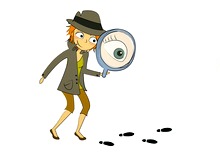| Back to Back Issues Page |
 |
|
English Detective #31, The Uses and Abuses of Research: Jan. 28, 2014 January 27, 2014 |
The current investigation (Introducing this issue):
Practice your English with two thought-provoking talks on the uses and abuses of research results. Neuroscientist Molly Crockett warns her listeners to watch out for “neuro-bunk:” commercial companies that try to sell products by exaggerating or misrepresenting research findings. She gives some funny examples, but it can lead to widespread misunderstanding of specific research and of the scientific process. Then Ben Goldacre talks about publication bias, and the problem of negative data going “missing in action.” Drug companies publish the results of trials that show favorable results, but doctors may never learn about trials that show that new drugs are not as effective as others they may already use. If all the information on a medication is not available, doctors cannot make informed decisions about the best drugs to prescribe for their patients. He gives examples, including a drug that he would not have prescribed if he had known about the problems found with it in several studies-- that were never published. After a brief discussion of some new vocabulary in these talks, there are links to a crossword puzzle to practice research vocabulary and to a page reviewing the scientific method (in case you’re interested.) 
Your First Clue: Vocabulary Emphasized in this Issue
conduct, consensus, consent, fluke, placebo, replicate (& unreplicable.) A few notes about the vocabulary:
To conduct is usually to lead someone, but to conduct an experiment means to do it (carry it out, or guide the research.) As a noun, ‘conduct’ is a person’s behavior—the way they act or conduct (lead) their lives. Consensus means general agreement—often a group agreement on something without a formal vote. When you read about ‘the consensus of scientific opinion,’ it means that most scientists agree about something. It is related to the AWL word ‘consent,’ which means permission, or to agree to something. The American legal term ‘consenting adults’ refers to two adults who agree to have sex. (‘Rape’ is when sex is forced on someone, and ‘statuary rape’ is when there is no force, but one person is considered too young to give voluntary legal consent to have sex.) ‘The consent of the governed’ is an important political doctrine expressed in the American Declaration of Independence. At the beginning of the Declaration it says that God has given certain rights that cannot be given away: “life, liberty, and the pursuit of happiness.” It continues “That to secure these rights, Governments are instituted among Men, deriving their just powers from the consent of the governed…” That phrase expresses a basic principle of democracy—that government is only legitimate when the people of the country consent to it (accept it). They give that consent in order to protect those basic rights, not to surrender them. A ‘fluke’ is an unusual, one-time, chance result— not a result you would expect or would be able to repeat. (It’s ‘unreplicable’!) A placebo is a ‘dummy’ or ‘sugar pill.’ It has no real medicine in it, but looks like a real pill. During drug trials some participants are given the new medicine to be tested, while other participants get a placebo. No one (neither researchers NOR participants) knows which group got the real medicine until after the test is completed. (This is called a “double-blind” experiment.) The purpose of a placebo is to test whether a medication really works, or if people just believe it works because the doctor gives it. “The placebo effect” refers to the fact that many people will get better if they believe they are taking real medicine, even if they are actually taking a pill with no medicinal value. This power of belief is why double-blind experiments are important to get valid results. To replicate is to reproduce—to make exact copies of the original, or to get the same results each time a test is done. So if something is unreplicable the results cannot be reproduced. Getting the whole story: reading/listening practice:
Click here for the TED talk on neuro-bunk. Here is the talk on the information doctors need —and often lack—about drugs. If you would like a little more background on the vocabulary of the scientific method,click here. Follow the Clues (Vocabulary Practice):
Here's the crossword. The answers are here. A note if you get gmail: Have you missed any issues of English Detective? if you find English Detective in your Promotions box, you can move it to your Primary box (if you want) by clicking on it and dragging it there, then clicking Yes when asked if you want to always get it in the Primary box. Coming in the next issue: Learning to ask the right questions. In case you missed these: Earlier issues of English Detective have articles on a number of topics, plus practice with all 570 words from the Academic Word List. You can check them out with the link to the back issues page below (or find what words were practiced each issue here. P.S. If youare not already getting English Detective, you can subscribe by completing the form here. (It's free!) |
| Back to Back Issues Page |